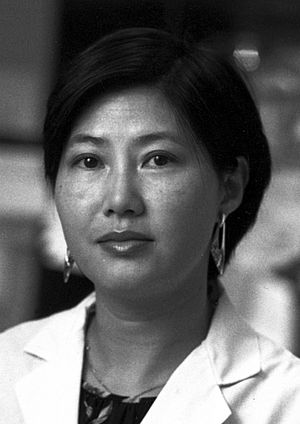Flossie Wong-Staal facts for kids
Quick facts for kids
Flossie Wong-Staal
|
|
|---|---|
 |
|
| Born |
Wong Yee Ching
August 27, 1946 |
| Died | July 8, 2020 (aged 73) La Jolla, California, U.S.
|
| Nationality | American |
| Alma mater | University of California, Los Angeles (Ph.D., 1972) |
| Known for | Cloning of HIV |
| Scientific career | |
| Fields | Virology |
| Institutions | University of California, San Diego, iTherX |
| Academic advisors | Robert Gallo |
Flossie Wong-Staal (born Wong Yee Ching, Chinese: 黄以静; pinyin: Huáng Yǐjìng; August 27, 1946 – July 8, 2020) was a Chinese-American scientist. She studied viruses and how living things work at a tiny level. She was the first scientist to make a copy of the HIV virus. She also figured out what its genes do. This was a very important step in showing that HIV causes AIDS.
From 1990 to 2002, she was a special professor at the University of California, San Diego (UCSD). She also helped start a company called Immusol. Later, this company changed its name to iTherX Pharmaceuticals. It started focusing on medicines for hepatitis C. Flossie Wong-Staal was the chief scientist there.
Contents
Early Life and School
Flossie Wong-Staal was born as Wong Yee Ching in Guangzhou, China, in 1946. She was the third of four children. In 1952, her family moved to Hong Kong. Many Chinese citizens moved there after big changes in China.
In Hong Kong, Flossie went to Maryknoll Convent School. She was very good at science there. No women in her family had worked outside the home or studied science before. But her parents supported her studies. Her teachers told her to study more in the United States. They also suggested she change her name to an English one. Her father chose "Flossie" after a huge storm that hit Southeast Asia around that time.
College and Advanced Degrees
When she was 18, Flossie left Hong Kong. She went to the University of California, San Diego. She studied bacteriology and earned her bachelor's degree in just three years. She graduated with honors.
After that, she earned a Ph.D. in molecular biology from UCLA in 1972. A Ph.D. is a very high degree. She then did more research at the University of California, San Diego. This extra research is called postdoctoral work.
Discovering More About HIV
Flossie Wong-Staal continued her research until 1973. Then, she moved to Bethesda, Maryland. She started working with scientist Robert Gallo at the National Cancer Institute (NCI). At the NCI, Wong-Staal began studying retroviruses. These are special kinds of viruses.
Two years later, Wong-Staal became the first person to make a copy of the HIV virus. She also created a map of the virus's genes. This map helped scientists understand HIV better. It also led to the first blood tests for HIV.
Important Research Projects
In the late 1970s, Flossie Wong-Staal's team worked with Dr. Gallo. They studied a human retrovirus called human T cell leukemia virus (HTLV). They found out that HTLV caused a type of human adult T cell leukemia. This was a big discovery. Before this, scientists were not sure if retroviruses could cause human diseases.
In 1990, Wong-Staal moved to the University of California, San Diego (UCSD). She started the Center for AIDS Research there. She kept studying HIV/AIDS at UCSD.
Gene Therapy and HIV
Wong-Staal's research focused on gene therapy. This is a way to treat diseases by changing genes. She used a special "molecular knife" called a ribozyme. This knife could stop HIV in stem cells. Her method was one of the first to get money from the U.S. government.
In 1990, Wong-Staal led a team that studied the Tat protein from HIV-1. They wanted to see how this protein affected the growth of cells. These cells were found in Kaposi's sarcoma lesions. These lesions are often seen in AIDS patients.
Her team tested cells with the Tat protein. They compared them to healthy cells. They found that more Tat protein meant more Kaposi's sarcoma lesions. These findings were very important. They helped create new treatments for HIV/AIDS patients with these dangerous lesions.
Achievements and Awards
In 1994, Wong-Staal became the head of UCSD's new Center for AIDS Research. In the same year, she was chosen to be part of the National Academy of Medicine. This is a very respected group of experts in the U.S.
In 2002, Wong-Staal retired from UCSD. She became a professor emerita, which means she kept her title after retiring. She then joined Immusol, the company she helped start. She was the chief scientist there. She realized that better medicines were needed for hepatitis C (HCV). So, she changed Immusol to focus on HCV treatments. The company was renamed iTherX Pharmaceuticals.
That same year, Discover Magazine named Wong-Staal one of the fifty "most extraordinary women scientists." She continued to be a research professor at UCSD until she passed away on July 8, 2020.
In 2007, The Daily Telegraph newspaper called Wong-Staal one of the "Top 100 Living Geniuses." The Institute for Scientific Information named her "the top woman scientist of the 1980s." In 2019, she was added to the National Women's Hall of Fame.
Personal Life
In 1971, while studying at UCLA, Flossie married Stephen P. Staal. He was also a student and later became a doctor who treated cancer. They had two daughters, Stephanie and Caroline Vega. They later divorced around 1990.
Wong-Staal later married Jeffrey McKelvy. He was a doctor who studied the brain. They started the company Immusol together. She had four grandchildren.
Flossie Wong-Staal died on July 8, 2020, at age 73. She passed away at Jacobs Medical Center in La Jolla. Her death was caused by problems from pneumonia.
See also
 In Spanish: Flossie Wong-Staal para niños
In Spanish: Flossie Wong-Staal para niños

